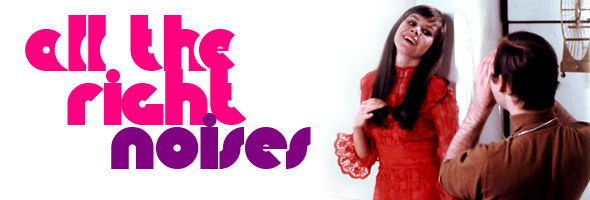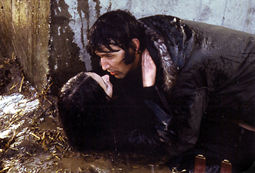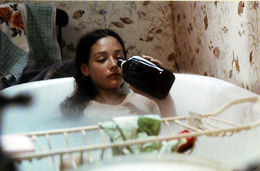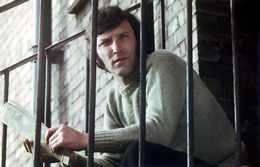

 One evening on the metro after a stage rehearsal, theatrical electrician Len Lewin (The L-Shaped Roomís Bell) strikes up a flirtatious conversation with pretty young chorus girl Val (Black Christmasí Hussey) and rapidly plunges into an affair. Len isnít exactly forthcoming that he also happens to be married to Val (Rowan & Martinís Laugh-Inís Carne) and has two small children, but Val has a bigger surprise; when she shows up in her school uniform, Len learns sheís still a couple months shy of sixteen, the legal age of consent. As their relationship develops and the wife has to go out of town for a while, the couple must deal with the obvious obstacles while deciding whatís best for themselves in the long run.
One evening on the metro after a stage rehearsal, theatrical electrician Len Lewin (The L-Shaped Roomís Bell) strikes up a flirtatious conversation with pretty young chorus girl Val (Black Christmasí Hussey) and rapidly plunges into an affair. Len isnít exactly forthcoming that he also happens to be married to Val (Rowan & Martinís Laugh-Inís Carne) and has two small children, but Val has a bigger surprise; when she shows up in her school uniform, Len learns sheís still a couple months shy of sixteen, the legal age of consent. As their relationship develops and the wife has to go out of town for a while, the couple must deal with the obvious obstacles while deciding whatís best for themselves in the long run. This surprisingly even-tempered and restrained film was made at the height of Swinging London fever on the big screen, but despite the vivid colour schemes on display, All the Right Noises is definitely a child of the British New Wave with an emphasis on subdued realism and emotional honesty. The film never goes for melodrama, so donít expect any violent deaths or traumatic abortions here. Instead the viewer gets to simply savor three terrific lead performances (Hussey in particular was a hot item fresh off the smash hit Romeo & Juliet) while the film also marks a rare directorial effort for Gerry OíHara, a very busy assistant director on such films as Tom Jones, Exodus and Our Man in Havana; his main directorial career gets quite a bit weirder with credits including the harrowing The Brute, the junky The Mummy Lives, and one of the trashiest films ever made, The Bitch. However, All the Right Noises marks one of his few personal efforts and is certainly worthy of rediscovery. His clever eye and impeccable knack for dramatic pacing result in a small, fragile miniature seemingly designed for discovery rather than widespread acclaim, essentially the sort of thing you discover flipping channels on a dreary afternoon and canít help but watch.
This surprisingly even-tempered and restrained film was made at the height of Swinging London fever on the big screen, but despite the vivid colour schemes on display, All the Right Noises is definitely a child of the British New Wave with an emphasis on subdued realism and emotional honesty. The film never goes for melodrama, so donít expect any violent deaths or traumatic abortions here. Instead the viewer gets to simply savor three terrific lead performances (Hussey in particular was a hot item fresh off the smash hit Romeo & Juliet) while the film also marks a rare directorial effort for Gerry OíHara, a very busy assistant director on such films as Tom Jones, Exodus and Our Man in Havana; his main directorial career gets quite a bit weirder with credits including the harrowing The Brute, the junky The Mummy Lives, and one of the trashiest films ever made, The Bitch. However, All the Right Noises marks one of his few personal efforts and is certainly worthy of rediscovery. His clever eye and impeccable knack for dramatic pacing result in a small, fragile miniature seemingly designed for discovery rather than widespread acclaim, essentially the sort of thing you discover flipping channels on a dreary afternoon and canít help but watch.
 Held up by distributor 20th Century-Fox for two years in most territories, this film never really found much of an audience but has been given a second lease of life as part of the BFIís superlative Flipside series. The transfer is taken from the best surviving archival print and has been restored to the best condition possible, but bear in mind this is still obviously below their usual top-notch standards. Detail quality is as good as the source will allow and colours are generally vibrant (though traces of the printís tendency to turn green still remain in a few of the darker moments), and whites are more blown-out than usual. That said, itís still comparable with watching an above-average repertory screening and probably the best itís ever going to look.
Held up by distributor 20th Century-Fox for two years in most territories, this film never really found much of an audience but has been given a second lease of life as part of the BFIís superlative Flipside series. The transfer is taken from the best surviving archival print and has been restored to the best condition possible, but bear in mind this is still obviously below their usual top-notch standards. Detail quality is as good as the source will allow and colours are generally vibrant (though traces of the printís tendency to turn green still remain in a few of the darker moments), and whites are more blown-out than usual. That said, itís still comparable with watching an above-average repertory screening and probably the best itís ever going to look.
![]()